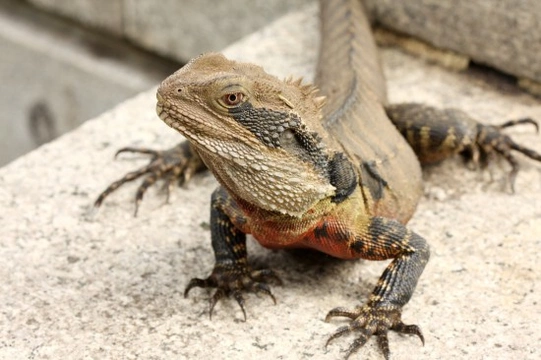
Recognising & Treating Worms in Reptiles
Looking after an exotic pet like a reptile can prove a bit demanding. Not only do you need to set up the right sort of environment for them to live in, but you need to know all about their nutritional needs too. Some reptiles need to live under special lights when kept in captivity otherwise they fall ill and could even die. You also need to read up on the types of internal parasites commonly found in reptiles and what you need to do to make sure they never suffer a heavy infestation which could prove fatal to them.
Below is a list of internal parasites that affect reptiles and the signs to look out for should your pet be heavily burdened with them:
Tapeworms
Most animals (and humans) on the planet can be infected by tapeworms. Reptiles, too can catch these nasty internal parasites. Tapeworms have a complex life cycle, they need an intermediate host in order to survive which is good news for reptiles kept in captivity because it helps reduce the chances of them being affected by tapeworms. However, it does happen so you need to keep a watchful eye out for any symptoms.
You may notice segments of the tapeworm in your pet's droppings although when at their larvae stage, they can also be evident in the layer of connective tissue found just below the skin. If this is the case, a vet would be able to surgically remove them. The best course of action is to seek veterinary advice on which product to use on your pet in order to get rid of them.
Roundworms
Unfortunately most reptiles can be infected with roundworms. These microscopic internal parasites live in a reptile's intestinal tract and when in their larvae stage can often be found in their respiratory tracts too. They often leave waste in the reptiles mouth which causes sores. By examining your reptiles droppings, you may be able to find some evidence of an infection and you should treat your pet with a recommended veterinary product as soon as you can. Failing to get on top of the infection could lead to a more serious condition or disease, namely pneumonia and in very severe cases of heavy infestation, it could prove fatal.
Roundworm larvae can penetrate a reptile's skin instead of getting into their system via their mouths and very often, the infection goes undetected until the reptile is literally infested with the parasites. Good hygiene is the key to preventing worm infestations in reptiles kept in captivity.
Spirurid Worms – Dracunculus Species
This parasitic worm causes skin sores with some also infecting a reptile's stomach lining, body cavity and blood vessels. They are transmitted to reptiles via mosquitos or ticks which means they are not seen that often in reptiles kept as pets in captivity. If you do notice a problem, the usual treatment is to increase the temperature in the reptile's environment for a couple of days. However, if your pet needs a cool environment, they may not be able to tolerate the high temperature, and therefore veterinary advice should be sought as soon as possible.
Tongue Worms – Pentastomes
Tongue worms are commonly found in many species of reptiles and a variety of things may be the root cause of an infection. Symptoms to look out for are usually associated to those connected with pneumonia. However, these nasty parasites can infect any tissue in a reptile's body, and the signs of them being present may vary as they migrate throughout the body.
Vets normally treat tongue worm with anthelmintic drugs although they are not always 100% effective at ridding a reptile of the parasites. There is a real issue with tongue worm in reptiles because the infection can be transmitted to humans as such if there is a heavy infestation present, a vet could well recommend putting a reptile to sleep because of the public health concerns it presents.
If you suspect there is a problem, you should consult your vet as soon as you can and they will recommend what course of action to take.
Hygiene is Crucial to the Well Being of All Reptiles
Although, you may think looking after a reptile is less demanding than looking after a dog, you would be very wrong. Reptiles need to be kept in very clean environments and therefore the time you need to spend cleaning out their enclosures is considerable. Several species of reptile are carnivores and therefore the risk of them being infected with worms from the food they eat is considerable – you would need to keep a close eye on them to make sure no infestation has taken hold.
The best way to do this is to keep an eye on their droppings on weekly basis checking there is no evidence of worms in it. If there is, then you would need to contact your vet and take your reptile to see them. A vet would be able to diagnose which worms are causing the infection and then either prescribe or recommend the right course of treatment for your pet.
Conclusion
Reptiles make fascinating pets to keep and if well looked after, do form bonds with their owners especially as many of them boast very long life spans. Setting up the perfect environment for them to live in and then keeping it extremely clean, is the key to them remaining in good health.



